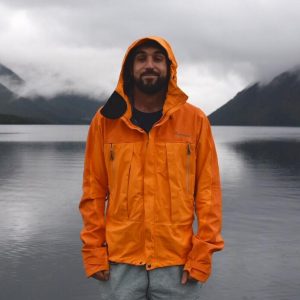Invercargill conservationist Thomas Rillstone brings Aotearoa’s colourful past to life in his podcast, the History of Aotearoa New Zealand.
What inspired you to enter the podcast world?
I was listening to a few other excellent history podcasts and eventually wondered if there was one on New Zealand. I thought there had to be one – we’re a small nation, but not small enough that surely someone hadn’t already come up with the idea. However, I couldn’t find one and eventually said, ‘Bugger it, I’ll do it’.
Podcasting is quite naturally suited to the format since it’s free, easy to access and doesn’t require listeners to devote lots of attention – people listen to podcasts on the drive to work, while cooking or just chilling in the bath. It also has the advantage of a lower barrier to entry in both equipment and skill.
Do you feel the NZ history you were taught at school was adequate?
Definitely not – it was part of what inspired me to start the podcast. I don’t really know much New Zealand history except the Treaty of Waitangi and even then I don’t know much of that, so every episode is as much a learning experience for me as it is for the audience.
What challenges have you had in creating the podcast?
There are things common to all podcasts, such as learning how to control your voice and how to edit. Then there are also a few things unique to what I’m doing, namely ensuring that I am being respectful of the people and places that I am talking about, especially since I am Pākehā and I have primarily talked about Māori up until now. It seems like a common sense thing to do but carefully choosing your words can really make all the difference in how you come across, no matter how genuine your intentions may be.
Why have you incorporated Maori legends into the podcast?
Māori myths, legends and stories were the way people recorded information, whether that be about why a tūī has white feathers on its chin or where the best place to find pounamu greenstone is. It’s also how people recorded the history of their tīpuna, ancestors, and passed it onto the next generation. Māori had to remember all of their history and pass it down orally. The easiest way to do that is to make the stories as true as possible but still memorable.
What kind of feedback have you had?
Most people enjoy being able to learn about who and what came before us and what led to where we are now. I’ve also had some people suggest people or events I should look at in the future which really shows that people are invested in our history and the project as a whole. Probably the most interesting piece of feedback was on my ‘accent’. Since I’m from the deep south, I roll my Rs like any true Southlander. This seemed to rather annoy one person who said my Rs distracted him as it was too like an American accent.
How much history do you hope to cover?
I started before the arrival of humans and have made my way up to when Māori were in Aotearoa prior to the arrival of Tasman and Cook, but I plan on as much as I can. I’ll cover the obvious stuff like the Musket Wars, Waitangi, Land Wars, the Kiingitanga, the women’s suffrage movement and all the big stuff in the 20th century you would expect until 2000, which is when I’ll stop. New Zealand’s small towns have great stories and characters in their history that I’d love to cover too, such as events around the gold rush.
What are your goals with this podcast?
The main goal was to help teach people, so as long as every listener comes away with one fact they can tell someone else, that’s a success already. In terms of wider goals though, it would be fantastic to have the podcast translated into Te Reo Māori. I think it would really help in reviving and sustaining the language. I’d also love it to be part of the curriculum when our history is being taught in schools – it would be great to help give kids not only the raw info on our history but also help light and build that passion for history in general.








